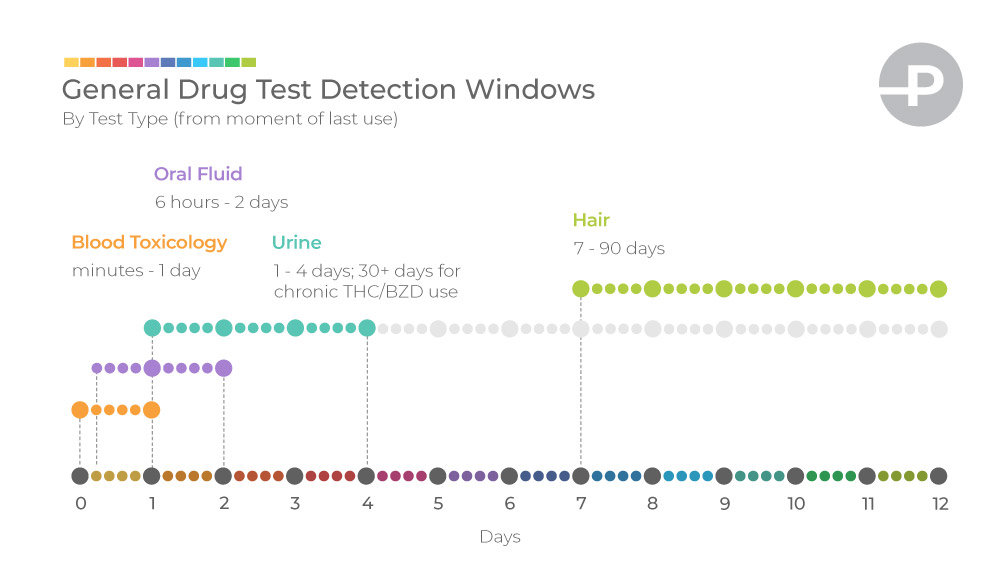We frequently get questions regarding drug tests and substance screening practices—and understandably so. Employers want to make sure they are implementing the best processes for their needs while offering the most comfortable experience possible to their candidates. While it may seem as simple as collecting a quick urine sample and getting an instant result, there is actually much more involved.
We wanted to answer some common drug test questions.
The FAQs
Is urine testing the best method?
It depends.
Drug testing can be accomplished by collecting samples of four primary varieties, namely, blood urine, hair, and saliva. Out of the four, urine is by far the most common. Urine is fairly easy to collect, yields reliable results, and can be tested relatively inexpensively. blood is much more invasive and can have longer wait times.
However, hair sampling provides a simple, non-invasive way to detect drug use (particularly cocaine, methamphetamine, and opiate use) over a greater length of time. Evidence of drug use that may be long out of the urine, and blood can remain in the hair for months. The biggest downfalls to hair tests are cost as well as the inability to detect recent use.
Now, saliva is on the other side of the spectrum than hair as far as detection. Saliva is great for detecting very recent instances of drug abuse, but quickly times out.
Urine is very much the happy medium between hair and saliva in terms of detection while remaining cost-effective and relatively non-invasive. For these reasons, it is widely preferred.
Which panel should I choose?
This depends entirely on your preferences and needs. The four most common drug testing panels are:
5-Panel: This panel typically tests for THC, Opiates, PCP, Cocaine, and Amphetamines.
7-Panel: This panel typically looks for marijuana, cocaine, opiates, PCP, amphetamines, benzodiazepines, & barbiturates.
10-Panel: The standard 10-panel drug test tests for marijuana, PCP, amphetamines, opiates (codeine, morphine & heroin), cocaine, benzodiazepines, barbiturates, methadone, propoxyphene, & methaqualone (Quaaludes).
12-Panel: These tests often screen for the same substances as the 10-panel with the addition of oxycodone and MDMA.
THC Considerations: You can find more information about drug testing for THC here.
Why aren’t all tests instant?
While the technology behind instant tests is improving, it is still less reliable than proven lab methods. For this reason, instant test kits that yield positive results are often verified at the lab. Simply put, instant tests are used more for quickly determining negatives than conclusively finding positives.
What is an MRO?
A Medical Review Officer (MRO) is a medical professional who verifies prescriptions with the candidate before drug test results are reported. Otherwise, prescribed users of certain medications such as Adderall may test positive for amphetamines; authorized users of certain opioids may fail the test as well, and so on. The use of an MRO is very important, helping provide the most accurate and actionable information possible.
You can find more detailed information about the MRO process here.
How long do drugs stay in the system?
Here are some rough estimates for how long common drugs can be detected in urine after consumption:
- Alcohol: 3-5 days in urine
- Amphetamines: 1-3 days
- Barbiturates: 2-4 days
- Benzodiazepines: 3-6 weeks in urine
- Cannabis: 7-30 days in urine
- Cocaine: 3-4 days in urine
- Codeine: 1 day in urine
- Heroin: 3-4 days in urine
- MDMA (ecstasy): 3-4 days in urine
How accurate are drug screening results?
Instant drug tests can be up to 99 percent accurate in determining negatives. The number is less for positive results.
Lab tests are more accurate than instant tests when it comes to verifying positives which is why many drug screening providers send all positive instant test results to the lab for further testing.
What types of drug screening programs do you offer?
Peopletrail offers a number of drug testing programs including:
- Pre-employment
- Random
- Reasonable suspicion
- Post-accident
- Return-to-duty
- On-site
- DOT-regulated screening
Conclusion
Drug screening can be a valuable part of your pre-hire process as well as your staffing audit protocols, helping you to determine whether or not your prospective or current employees are free from illicit substances. Such determinations provide peace of mind and promote safety in the workplace. However, drug testing isn’t a one-size-fits-all solution. There are a number of solutions for a variety of different needs. Implementing a drug screening process within your organization will take a bit of fine-tuning. If you have any questions regarding drug testing or other employment screening solutions, feel free to contact us, today.









